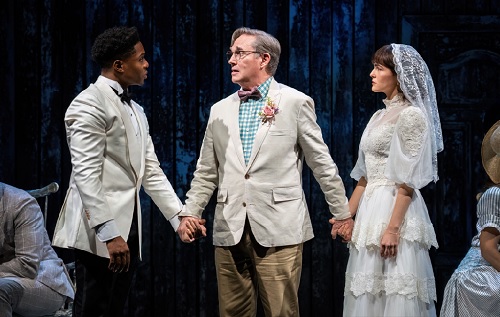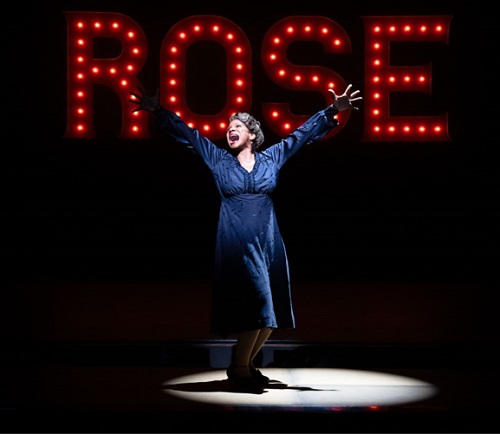NYC News
Review: is It Worth Visiting Our Town?
October 10, 2024, 11:38.37 pm ET

Photo: Joan Marcus
By Brian Scott Lipton
Unlike much of America, I didn’t encounter Thornton Wilder’s seminal 1938 play “Our Town” in high school – where many people fell in love with it. And, yes, I know numerous theatergoers who have seen this work for the first time later in life and agree with the legendary Edward Albee that “it is the greatest American play ever written.”
No offense to Mr. Albee, but “Our Town,” has always struck me as alternately boring, banal and, at the end, admittedly rather moving. And nothing about Kenny Leon’s non-traditional production, now at the Ethel Barrymore Theatre, has caused me to change my overall opinion.
To my mind, the play (now presented in 105 intermissionless minutes) suffers from one major problem; it gives us essentially two-dimensional characters in too-short snippets, denying us the kind of investment we need to have in these people, while wasting precious time “showing us” where the post office is or talking about the weather. (The minimal scenic design is by Beowulf Boritt.)
Admittedly, Leon doesn’t seem as comfortable with this play as he did with “Purlie Victorious” or “Topdog/Underdog,” but I applaud this production’s diversity. Setting the play both in the past and now (somehow?), Leon has much of the small New Hampshire town of Grover’s Corners populated by African Americans -- especially the prosperous Gibbs family, extremely well played by Billy Eugene Jones, Michelle Wilson, and a slightly too mature but still effective Ephraim Sykes as their teenage (then 20something) son George.
Above all, he’s handled the show’s largest part, the Stage Manager, to the affable, out actor Jim Parsons. He plays down the effeminacy of some of his previous stage roles, but I think Parsons is still meant to portray this quasi-narrator as a (perhaps closeted) gay man. Engaging as he can be, though, Parsons lacks the gravitas of some of his predecessors in the role, including Henry Fonda and Paul Newman, instead sounding primarily like his nerdy “Big Bang Theory” character Sheldon Cooper during his fictional TV show “Fun with Flags.”
Still, Parsons does find some much-needed humor in the text, as do such players as the ageless Richard Thomas as the wry newspaper editor Charles Webb (nicely matched by the still-stunning Katie Holmes as his dutiful wife, Myrtle, and the lovely Zoey Deutch as his precocious daughter Emily) and the ever-hilarious Julie Halston as town busybody Luella Soames.
Leon also does well with the show’s central romance between Emily and George, and the scene where the two teens finally confess their feelings is lovely. Still, Leon’s direction and the actors’ talents are at their finest in the show’s final, saddest section, when a now-dead Emily – who has passed while giving birth to her and George’s second child – insists on returning home for one “ordinary” day (her 12th birthday). Struck by how we foolishly ignore the beauty of everyday life, Emily urges us to appreciate everything about the here-and-now. You would literally need to be made of stone not to shed a tear or two.
Indeed, Wilder is to be applauded for giving us a valuable and universal life lesson. I just wish getting there didn’t feel so much like listening to a lecture.
LATEST NYC NEWS

Frrrozen Decadence: Last Crumb x Serendipity3 Unveil the Ultimate Holiday Cookie
December 20, 2024, 5:54 pm ET
Last Crumb, the viral Hollywood cookie sensation, has teamed up with iconic NYC eatery Serendipity3 to debut the Frrrozen Hot Chocolate Cookie. Inspired by Serendipity3’s legendary dessert, th... READ MORE

Angelina Bakery Brings Holiday Cheer with Toys for Tots Drive at Times Square
December 20, 2024, 5:54 pm ET
Angelina Bakery, renowned for its Italian-inspired treats, is celebrating the soft opening of its 7 Times Square location with a heartwarming Toys for Tots drive this Sunday and Monday. Partnering ... READ MORE

Review: Audra McDonald is Not to Be Missed in Gypsy
December 20, 2024, 12:04 am ET
By Brian Scott Lipton As has been frequently noted, conquering the role of the domineering stage mother Rose in the 1959 Arthur Laurents-Jule Styne-Stephen Sondheim musical, “Gypsy,” no... READ MORE


 Sign up for our newsletter !
Sign up for our newsletter !